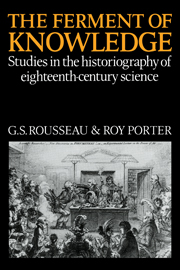2 - Natural philosophy
Published online by Cambridge University Press: 03 May 2010
Summary
Introduction
The dominant historiographical tradition of eighteenth-century physical science presents natural philosophy as a coherent, unified body of theory and practice. The seminal texts of this tradition, Metzger's Newton, Stahl, Boerhaave (1930), Brunet's L'introduction des théories de Newton en France (1931), Cohen's Franklin and Newton (1956), and others, all picture natural philosophy as a set of discourses which are unified by their debt to Newton and their base in matter-theory. In this picture, Newton's legacy is constituted by the collection of his texts which the eighteenth-century natural philosophers absorbed, albeit selectively and in a highly interpretative fashion. The Principia, the Opticks, the ‘Queries’ to the successive editions of the Opticks issued in Newton's lifetime (1704, 1706, 1717), and the letters to Oldenburg, Boyle and Bentley, not published till the mid-century, havev all been taken by historians as starting points for the various aspects of what has nevertheless remained a single embracing tradition. Major eighteenth-century interests in the aether, in interparticulate forces, in the role of activity in matter, have all been interpreted in terms of various differing selections from these original texts. In this way, the problem of the object of discourse, and of the relation between that object and the natural philosophical enterprise, has been circumvented. Historians have adopted an approach whose method is profoundly unhistorical.
- Type
- Chapter
- Information
- The Ferment of KnowledgeStudies in the Historiography of Eighteenth-Century Science, pp. 55 - 92Publisher: Cambridge University PressPrint publication year: 1980
- 8
- Cited by



